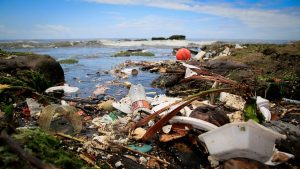Regional and Local Governments are Critical for Ocean Action from Source to Sea
The future of the ocean will largely depend on what happens in cities and regions, but local decision-makers often find it difficult to shoulder this responsibility. In a recent panel, SIWI’s Birgitta Liss Lymer talked about why the local and regional level is so important.
Regional and local governments have a critical role to play if we are to achieve SDG 14 about Life Below Water. This was the key message from SIWI’s Birgitta Liss Lymer in a panel discussion organized by the UNDESA Division for Sustainable Development Goals (DSDG) on 23 June. Birgitta Liss Lymer represented the Action Platform for Source-to-Sea management in an online session titled ‘Keeping the Momentum for Ocean Action: Local and Regional Governments leadership in the COVID-19 era’.
“We know the problems and what causes them, however, we do not always have the tools to address them in an effective way”, Birgitta Liss Lymer said and called for more attention to the role of fragmented governance.
In particular she wants to draw attention to decision-making in cities and regions – it is at this level many critical decisions are taken that ultimately determine the pressure our communities put on the ocean. It is also here much of the responsibility should lie for adapting to the negative impacts of sea-level rise, coastal erosion and a deteriorating ocean health.
Birgitta Liss Lymer emphasized how activities on land, along rivers and further upstream from the coast can be challenging to address for a number of reasons. Firstly, many of the activities take place far away from the ocean so that its impact downstream is not easily recognized. Second the cumulative impact of many different stressors are often forgotten and is hard to tackle when there is not just one actor what is solely responsible. Addressing these issues effectively requires a coordinated agenda between upstream and downstream actors, as well as cooperation across sectors and governments.
During the session, many local government representatives described how they in their daily lives experience the fragmented governance that Birgitta Liss Lymer warned of. Representatives from Barbados, Belize, Canada, Indonesia Mexico and Portugal also expressed a need for consultative approaches to ocean management where they could collaborate with other stakeholders.
“Ocean action requires solutions that benefit the system as a whole, which is why we need a source-to-sea approach as a complement to traditional management structures”, Birgitta Liss Lymer says.
The session was one example of the growing interest in source-to-sea management, which can provide local decision-makers with the tools they need. Though the Covid-19 pandemic has led to events such as the 2020 United Nations Ocean Conference being postponed, many actors want to fast-track the transition towards a clean, blue and just ocean economy.








